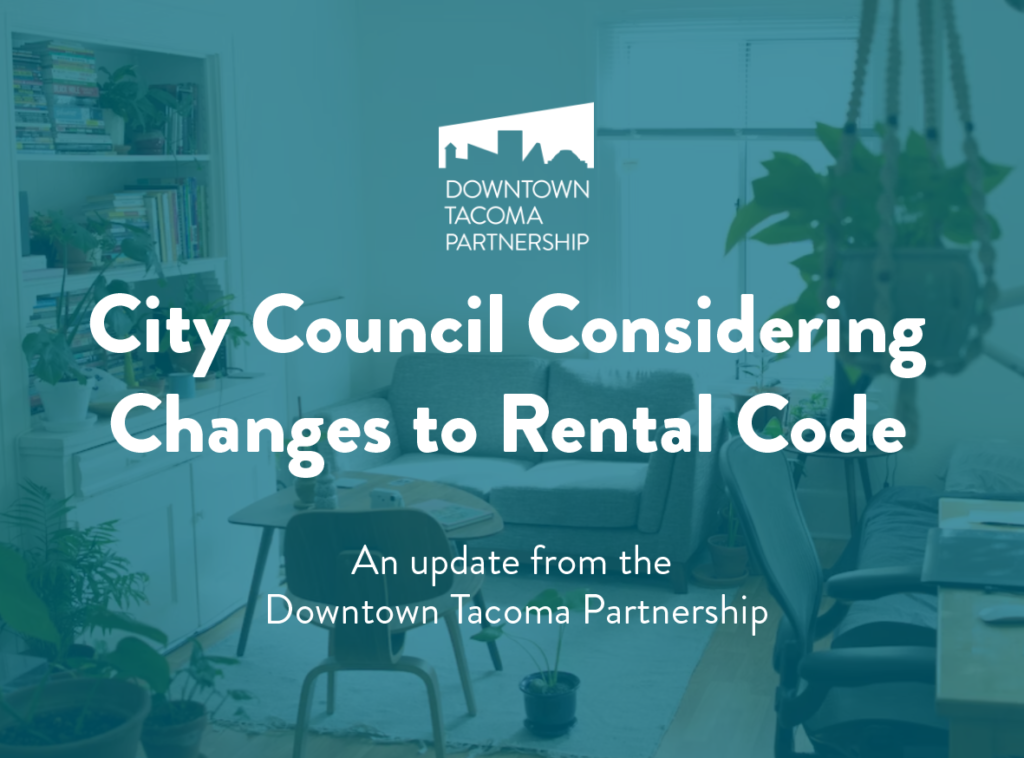
City Council Considering Changes to Rental Code, Feedback by July 11
On Tuesday, June 27th, the City Council brought forward Ordinance No. 28894 that would significantly alter the rental housing code reducing property rights to provide more benefits to renters. As an organization representing property owners in Downtown Tacoma and the general economic wellbeing of Downtown, the Downtown Tacoma Partnership wants to make sure those impacted by these proposed changes are aware of them and have an opportunity to weigh in. The ordinance has the potential to both impact property values and diminish future investment in housing as the Council removes property rights.
If there is a common agreement among stakeholders, it is that we need more housing in Tacoma. At the same time, no one believes the proposed changes will increase housing supply. In fact, there is a general recognition that fewer units will be built thanks to the increased challenges this ordinance brings.
Because of the speed of this measure before council, the DTP mailed out a postcard to all property owners in Downtown Tacoma and provided this blog post. We will also be commenting directly to City Council. It is clear property owners and landlords were not part of the process of developing these regulations.
We encourage Downtown Tacoma stakeholders to weigh in and let City Council know their thoughts by July 11th. The City Council can be reached via cityclerk@cityoftacoma.org or can be emailed as a group using this link: Mail City Council
While the full ordinance is 18 pages long and includes specific municipal code edits, five highlights are:
A. Requiring 120-day notice for rent increases
B. Sets maximum screening standards for income to rent ratio at 2.5x for most private units
C. Prohibits landlords from requiring SSN for tenant screening
D. Caps late fees at 1.5% of rent or $75, whichever is less
E. Requires landlords to offer 6 monthly payments for any move-in fees
In addition, some councilmembers are proposing additional amendments as follows, though specific text is not available:
- Winter Eviction Limitations [proposed by Councilmembers Diaz & Daniels]: Prohibits evictions December to March.
- Economic Displacement Relocation Assistance [CM Daniels & Diaz]: Would require landlords to pay relocation costs when increasing rent over a threshold (10%?).
- Further Reducing Maximum Income to Rent ratio [CM Daniels & Diaz]: Currently there is no threshold, but this would set maximum income to rent ratio at 2x for most units
- Replaces Pet Deposit with Pet Fees [CM Rumbaugh]: Would provide for a monthly pet fee or pet rent.
- Prohibits Dog Breed Restrictions [CM Diaz & Daniels]: Would prohibit excluding a pet based on breed alone. Still allows size/weight restrictions.
For a more detailed look at the ordinance and potential challenges for renters and landlords, please see the following:
The full ordinance can be found here: https://cityoftacoma.legistar.com/gateway.aspx?M=F&ID=6d4a58ae-dac4-406f-bf1e-e652cafd809b.pdf
City Council presentation on the ordinance can be found here:
https://cityoftacoma.legistar.com/gateway.aspx?M=F&ID=49b19ae3-d730-4819-be63-964b7f85313c.pdf
Additional detail on the five main impacts:
- Requiring 120-day notice for rent increases (TMC 1.95.060 )
“A landlord is required to provide at least 120 days’ written notice whenever the periodic or monthly housing costs to be charged a tenant will increase…”
This will double the length of time required under the current state standard of 60-days (RCW 59.18.140) putting greater burden on the landlord to determine the state of the market four months out. Inadvertently, this may result in increased rent to take this unpredictability into account.
- Sets maximum screening standards for income to rent ratio at 2.5x for most private units (TMC 1.95.035 Tenant Screening (new section))
Specifically, rents above the US Department of Housing and Urban Development’s annual declaration of “Fair Market Rent” will have income maximum’s capped at 2.5 times the monthly rent (eg a $1000/mo unit may not require more than a $2500/mo income). Rents below the “Fair Market Rent,” largely subsidized units, will have income maximum’s capped at 3 times the monthly rent (eg a $1000/mo unit may not require more than a $3000/mo income). Tracking the “Fair Market Rent” and compliance with this standard will be landlord’s responsibility.
Many landlords use a multiple of the monthly rent to determine the minimum income to rent a unit. This allows for a clear line based on past experience and a desire to avoid rent-burdened tenants. Most who use this type of standard currently use 3x, largely consistent with the goal of not having tenants spending more than 30% of their income on rent. The establishment of a maximum income and lowering it below current practice will result in higher risk of default and more rent-burdened residents in Tacoma.
- Prohibits landlords from requiring SSN for tenant screening (TMC 1.95.035 Tenant Screening (new section))
“No landlord shall require that any tenant, prospective tenant, occupant, or prospective occupant of rental property provide a social security number for any reason…”
The most direct way to tell if someone is going to pay their bills is if they have historically paid their bills. A credit report is the most direct way to do this, but these are generally not available without a social security number. This is why so many landlords use a credit report to determine eligibility. Prohibiting this will significantly cripple their ability to do effective tenant screening, significantly increasing risk.
- Caps late fees at 1.5% of rent or $75, whichever is less (TMC 1.95.065 Late Fees (new section))
“Any fees for late payment of rent shall be limited to 1.5 percent of the unpaid monthly rent, and not to exceed $75.00 per unpaid monthly rent. No other fees may be charged for late payment of rent, including for the service of any notice required under state law, or any legal costs, including court costs and attorneys’ fees.”
This creates an arbitrarily low cap on late fees inconsistent with any invoicing practices in the industry. For a $1000/mo unit, the maximum allowable late fee would be $15. Most late fees are higher to create an incentive to pay the rent on time.
- Requires landlords to offer 6 monthly payments for any move-in fees (TMC 1.95.040 Deposit Requirement and Installment Payments Permitted)
“..the tenant may elect to pay the security deposit and , non-refundable move-in fees, and last month’s rent … in six consecutive, equal monthly installments that begin at the inception of the tenancy.”
Currently, the code requires three monthly payments. Moving to six will, again, increase the risk landlords will take on should a tenant fail to pay the security deposit or other amounts in full. Inadvertently this could increase the amounts requested as deposits to offset this risk.
Cumulatively, these changes have the potential to decrease investment in additional housing, something our community desperately needs. I hope this information allows for greater understanding of some of our concerns. Furthermore, I hope others will share their thoughts with Council as well.
Please don’t hesitate to contact me at davids@tacomachamber.org if you have any questions or would like more information on this measure.





